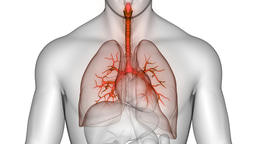Call for papers: Connective tissue disease-associated interstitial lung disease
Published in Healthcare & Nursing and General & Internal Medicine

BMC Pulmonary Medicine is calling for submissions to our Collection on connective tissue disease-associated interstitial lung disease.
Interstitial Lung Disease (ILD) is a common manifestation of several systemic autoimmune connective tissue diseases (CTDs). While ILD can manifest with all CTDs, it most commonly affects individuals with rheumatoid arthritis (RA, 10-30%), systemic sclerosis (SSc, 40-80%), and idiopathic inflammatory myopathy (IIM, 40%). In some patients, ILD could also be the initial or only manifestation of an underlying CTD and the research classification “interstitial pneumonia with autoimmune features (IPAF)” was recently proposed to identify these patients. ILD poses a significant burden, contributing to morbidity and mortality among CTD patients. Given the complexity in the diagnosis and treatment of CTD-related ILD, a multidisciplinary approach to management is crucial.
Over the years, advances in research have improved our understanding and management of CTD-related ILD. However, there are still significant gaps in our knowledge. With the emergence of new therapies for this patient population, there is an increased need to identify clinical characteristics and biomarkers that could predict those who are likely to develop ILD and/or have progressive disease. There is also a continued need to understand additional mechanistic pathways that lead to ILD, in order to develop novel therapies.
For this research topic collection, BMC Pulmonary Medicine invites basic and clinical research papers that could enhance our understanding of CTD-associated ILD and contribute to the advancement of patient care.
Topics of interest for this Collection include but are not limited to:
• Mechanisms and genetics associated with CTD-ILD
• Epidemiology of CTD-ILD: prevalence, mortality, hospitalizations
• Early diagnosis, risk predictors and biomarkers that could predict development and prognosis of CTD-ILD
• Novel therapies for CTD-ILD
• Barriers/limitations to timely care
• Multidisciplinary approach to diagnosis and treatment, and other treatment models
Meet the Guest Editors
Bruno Guedes Baldi: University of Sao Paulo Medical School, Brazil
Dr Bruno Guedes Baldi is a Pulmonologist. He is the Medical Assistant of the Pulmonary Division, Heart Institute (InCor) at the University of Sao Paulo Medical School, Sao Paulo, Brazil. His expertise is in interstitial and rare lung diseases, with a hundred articles published. He has served as an editor, including Associate Editor of Frontiers in Medicine and BMC Pulmonary Medicine, as well as Editor-in-Chief of the Jornal Brasileiro de Pneumologia from 2019 to 2022
Niranjan Jeganathan: Loma Linda University Health System School of Medicine, US
Dr Niranjan Jeganathan is a pulmonologist with a special interest in interstitial lung diseases (ILD). He is the Director of the ILD Center at Loma Linda University (California) which is a Pulmonary Fibrosis Foundation Care Center. His research interest within ILD is in understanding the epidemiology of ILD including Connective Tissue Diseases-Related ILD. He has been an editor for other research collections related to ILD. In addition, he has reviewed numerous ILD articles for many different journals.
Jin Woo Song: University of Ulsan College of Medicine, South Korea
Dr Jin Woo Song is Professor in the Department of Pulmonary and Critical Care Medicine at the University of Ulsan College of Medicine, South Korea. He is currently Director of the ILD Program at Asan Medical Center in Seoul, South Korea. His academic interests include the effects of air pollution on clinical outcomes in ILD, metabolic changes in ILD and biomarkers in ILD.
Submission Guidelines
This Collection welcomes submission of original Research Articles. Should you wish to submit a different article type, please read our submission guidelines to confirm that type is accepted by the journal. Articles for this Collection should be submitted via our submission system, Snapp. During the submission process you will be asked whether you are submitting to a Collection, please select "Connective tissue disease-associated interstitial lung disease" from the dropdown menu.
Articles will undergo the journal’s standard peer-review process and are subject to all of the journal’s standard policies. Articles will be added to the Collection as they are published.
The Guest Editors have no competing interests with the submissions which they handle through the peer review process. The peer review of any submissions for which the Guest Editors have competing interests is handled by another Editorial Board Member who has no competing interests.
Submission Status: Open | Submission Deadline: 8 April 2024
Follow the Topic
-
BMC Pulmonary Medicine

This journal is an open access, peer-reviewed journal that considers articles on all aspects of the prevention, diagnosis and management of pulmonary and associated disorders, as well as related molecular genetics, pathophysiology, and epidemiology.
Your space to connect: The Primary immunodeficiency disorders Hub
A new Communities’ space to connect, collaborate, and explore research on Clinical Medicine, Immunology, and Diseases!
Continue reading announcementRelated Collections
With Collections, you can get published faster and increase your visibility.
Cancer and the lung
BMC Pulmonary Medicine is calling for submissions to our Collection on Cancer and the lung. Lung cancer remains one of the most prevalent forms of cancer worldwide, presenting unique challenges in both diagnosis and treatment. The complexity of lung cancer is exacerbated by the interplay between pulmonary conditions and various risk factors, including smoking, environmental exposures, and genetic predispositions. With advances in research, there is a growing understanding of the molecular mechanisms intertwined with lung cancer development and progression. The need for innovative approaches to diagnosis and treatment, as well as effective management strategies for patients, is more critical than ever in the fight against this devastating disease.
Research in the field of lung cancer has witnessed significant progress, particularly with the advent of targeted therapies and immunotherapies that have transformed treatment paradigms. As we gain more insight into the biology of lung cancer, we are better equipped to tailor therapeutic strategies that not only improve survival rates but also enhance the quality of life for patients. Understanding the role of lung cancer in the context of immunosuppression and infection opens new avenues for enhancing patient outcomes, especially in those with comorbidities. Potential research topics can include but are not limited to:
•Mechanisms of lung cancer development
•Innovations in lung cancer diagnosis
•Immunotherapy and lung cancer treatments
•Impact of lung infections in cancer patients
•Chemotherapy and its effects on lung health
This Collection supports and amplifies research related to SDG 3: Good Health and Well-being.
Publishing Model: Open Access
Deadline: Mar 11, 2026





Please sign in or register for FREE
If you are a registered user on Research Communities by Springer Nature, please sign in